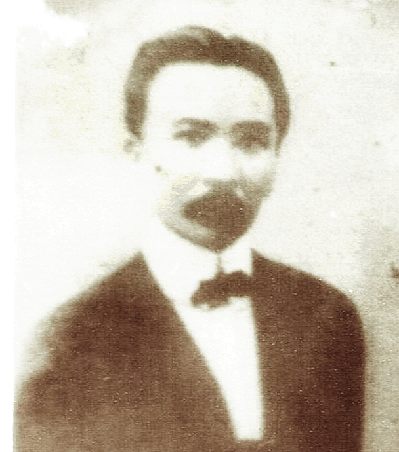 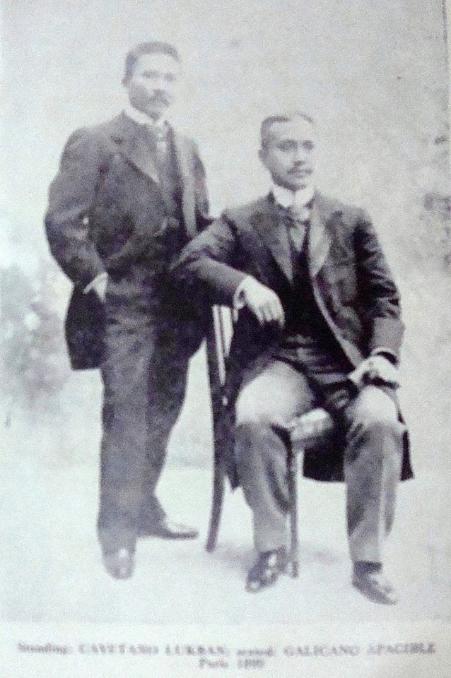
Cayetano Lukban as Secretary of Public Instruction with Galiciano Apacible in Europe gathering support from the European Countries to Recognize the Philippines as an Independent Nation circa 1900
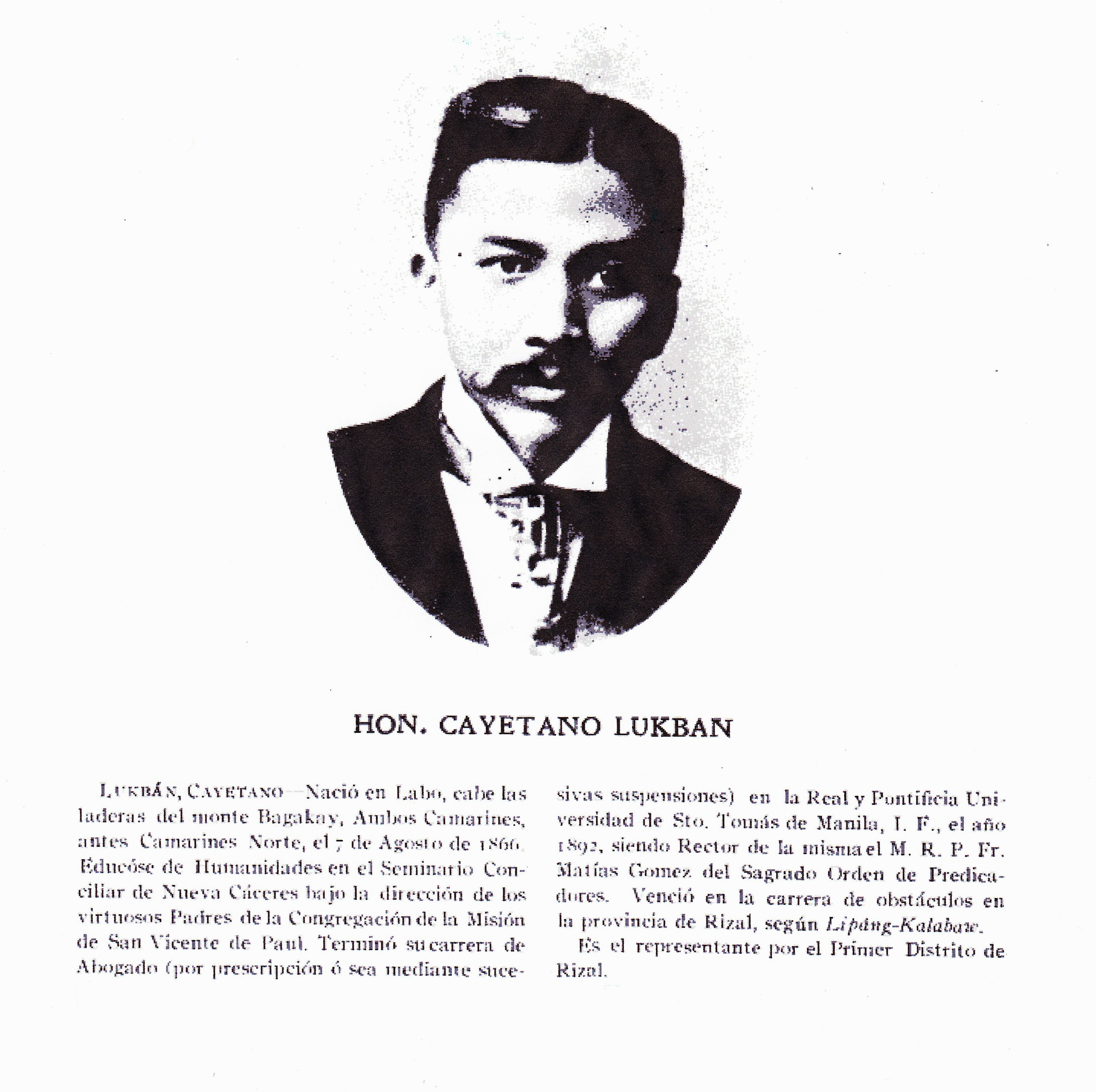 Cayteno Lukban - 1908 Album histórico de la primera Asamblea filipina. Compilado por Anthony R. Tuohy. Fotografias y biografias reproducidas de "La revista filipina" suplemento español del The far eastern review
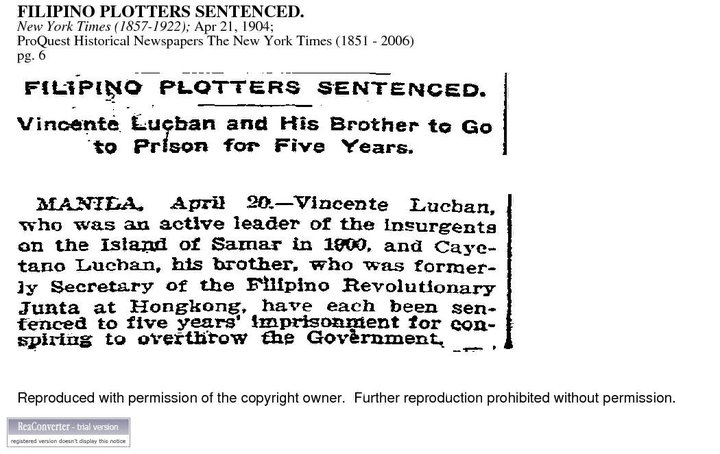 NY Times April 20, 1904 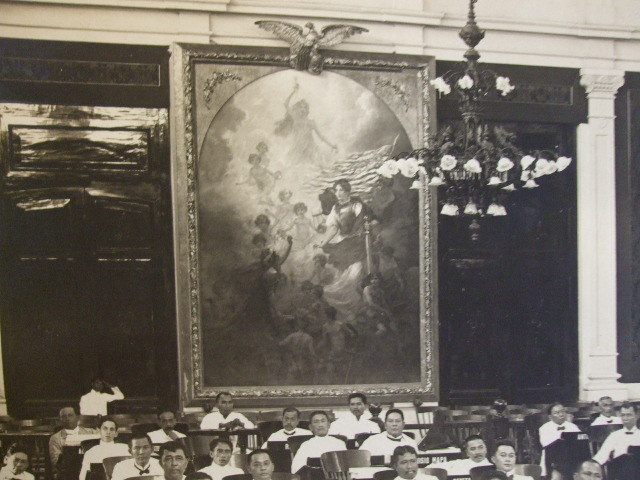 .jpg) Cayetano Lukban in the 1st Philippine Legislature 1907. (Top picture- lower right section with moustache: Lower Picture-top row center just below the left stars, with moustache) |
CAYETANO R. LUKBAN (1866 - 1938) 1901 Secretary of Public Instruction - Philippine Central Commitee - Hong Kong Junta 1907-1909 -2nd District Rizal Representative -1st Philippine Legislature 1910 - Cagayan and Isabella - Provincial Fiscal 1914-1916 - Judge - Cebu, Bohol, Leyet, Samar, Negros Oriental 1919-1922 - Director Bureau of Lands 1922 - 1931 - Judge - Tarlac, Bataan, Neuva Viscaya, Rizal, Isabela, Zambales 1935-1936 Camarines Norte Representative - 1st Philippine Assembly A man of strong convictions and a patriot, Cayetano Lukban y Rilles was one of the members of the First Philippine Assembly. He was born in Labo, Camarines Norte on August 7, 1866 to Agustin Lukban and Andrea Rilles. He studied at the University of Santo Tomas, where he obtained his bachelor of laws degree in 1892. He married Sabina Cruz Herrera and fathered two children; Jose and Remedios. His wife was the sister of his law school classmate, Arsemio Cruz Herrera, and she help institute the "Asociacion de Damas de Cruz Roja" which eventually became the Philippine Red Cross. Lukban began his legal career in his home province, as an ex-officio attorney for poor litigants with pending court cases. Being better educated than most of his town mates, he was selected later as one of the 12-man council of the principalia of Labo, which had been constituted by the Maura Law of 1893. He received no salary, and although he served on it only briefly, he was able to accomplish some notable projects, like the improvement of the town’s roads. Lukban was then appointed fiscal promotor, or prosecuting fiscal, and registrador de la propiedad of La Union. However, he became embroiled in official intrigues after he incurred the ire of the province’s civil governor and an Augustinian friar for supporting a candidate for municipal captain of a town whom the Spaniards opposed. Lukban, who was already a Freemason at the time, was accused of being a filibuster, as well as anti-Catholic and anti-Spain. At the outbreak of the Philippine Revolution in 1896, he fled to Spain to escape the reign of terror waged by the colonial authorities against people whom they perceived to be harboring liberal and pro-independence beliefs. Upon arriving there, he wrote to the King of Spain, revealing to him the real causes of the revolution and suggesting to him possible remedies if Spain wanted to continue its rule in the Philippines. His letter was taken up during a meeting of the Council of Ministers, which was presided by Queen Cristina. On December 14, 1898, together with Rafael del Pan, Tomas Arejola, Isauro Gabaldon, Pascual Poblete, Isabelo de los Reyes, Modesto de los Reyes, Ramon Trias and Vicente Illustre, they formed the Filipino Republican Committee of Madrid to conjure up support in Spain for Philippine Autonomy and Independence before the Ratification of the Treaty of Paris. Lukban then left Spain. He lived in Hong Kong with other Filipinos who had formed the Philippine Central Committee, also known as the Hong Kong Junta, led by Galicano Apacible. The Junta, in which Lukban served as secretary, was the unofficial listening post abroad of the revolutionary government in the Philippines. It presented the Philippine position in foreign countries and fought for the recognition of Philippine independence, especially by the United States, which had already claimed title to the country by virtue of the Treaty of Paris. During the Filipino-American War, the Junta tried to solicit aid for the Philippine Government and served as a conduit for military supplies for the revolutionary forces. In 1901, when American rule was firmly established in the country after the capture of Aguinaldo, Lukban returned to the Philippines, ending a five-year exile. He went to Cebu where he met Sergio Osmena, who was then a young lawyer and newspaperman, and established the Lukban & Osmena Law Office. In 1904, he was arrested with his two brothers on charges of conspiracy in advocating Philippine independence. The lower courts found him guilty, but the Supreme Court acquitted him. The Americans, however, continued to suspect him of conducting subversive activities. During the elections for the First Philippine Assembly on July 30, 1907, Lukban won as delegate for the first district of Rizal. As a representative of the Assembly, he was voted as a Commisioner to the United States, was part of the Committee on Banks and Corporations, and part of the Committee on the Construction of the Capitol. After serving his brief term, he was appointed provincial fiscal of Cagayan and Isabela in 1910. Lukban was appointed auxiliary judge of the provinces of Cebu, Leyte, Samar, Bohol and Negros Oriental in 1914; judge of the court of First Instance of Leyte in 1916, and judge of the Courts of First Instance of Bohol and Negros Oriental in 1916. He left the judiciary in 1919 when he became director of the Bureau of Lands. In 1922, he returned to the judiciary when he was again appointed judge of Isabela and Nueva Vizcaya. The following year, he was assigned to Bataan and Zambales and, the next year, to Tarlac, where he remained until 1931, when he was appointed judge of the Court of First Instance of Rizal. In 1935, Lukban returned to the legislative branch when he was elected as representative of Camarines Norte for the 1st Philippine Assembly under the Commonwealth government. He was forced to annul his position in 1936 as there was controversy over lack of his residency in Camarines Norte. Per Proclamation No 163, S.1937, President Manuel Quezon proclaimed special elections to fill the existing vacancy of Cayetano Lukban Assemblyman for Camarines Norte. Lukban, whose career spanned 40 years, was one of the few Filipinos who served their countrymen during the Spanish, revolutionary, and American periods. References: Asemblea Filipina: Diario dela Tarde. 1907 Galang, Zoilo M. Encyclopedia of the Philippines Volume 6. Manila: P. Vera and Sons Co., 1935.
|